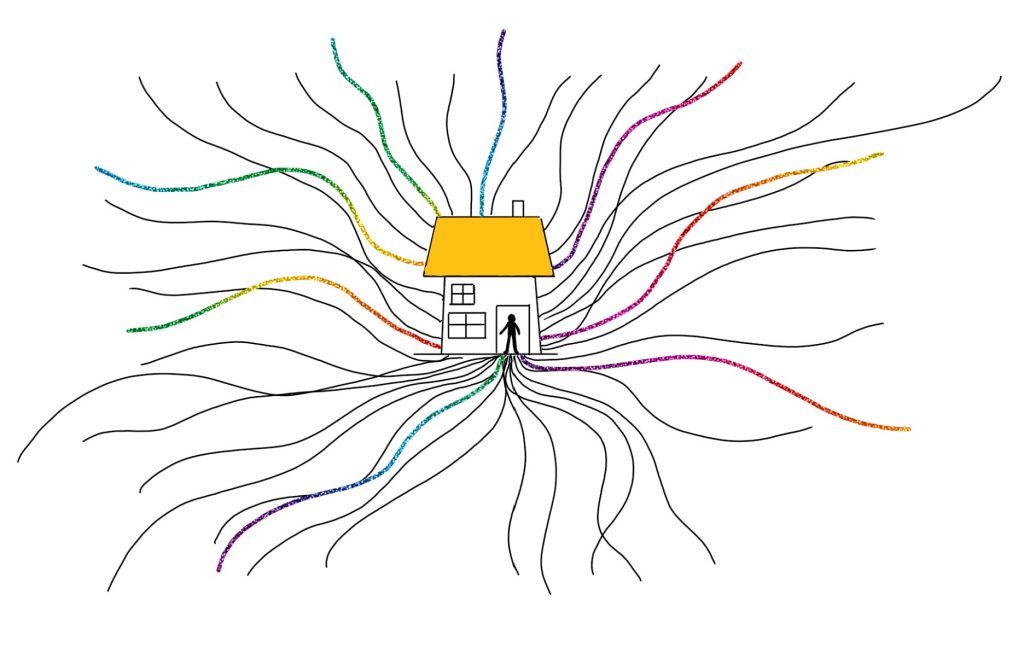How To Manage Anxiety As We Leave Lockdown

The lockdowns and turbulence of covid-19 has left many of us feeling anxious, disconnected and unsure. Life as we know it has changed for many of us, leaving our emotional systems in haywire – not knowing how to feel or move forward.
Coming out of lockdown presents its own unique challenges. How do we re-adjust? What do we want to do differently? How can we feel safe? These are only some of the difficult questions we ask ourselves when facing the next chapter.

Amidst this turbulence, it is easy to feel as if our anchor in life has become disrupted. The sense that we feel safe, we have some stability in our lives, that we are grounded – these feelings are woven into our emotional consciousness from society, our jobs, our hobbies, friends, families… just about anything! And because a lot of our sources of stability, comfort and safety have been compromised, it feels as if we are living lives that don’t quite feel our own. We feel less grounded.

7 Steps Out Of Lockdown
So, how do we move forward? Firstly, we need hope. Hope is more than a feel-good emotion. Hope is a deliberate feeling from focusing on the good things to come. It allows motivation and confidence that your goals can be reached, and it is generated by becoming grounded in the present.

There are several things you can do to ground yourself and foster hope during this period of change. Some are as simple asking yourself some questions, others are some habits you can start, or tasks you can set yourself. The important thing to remember is to take it at your own pace. This is a unique situation, and everyone will have their own way of coping. These suggestions are here to help you find yours.
- Talk to friends and loved ones
It’s important to talk about how you feel – whether that’s in person or online. Don’t dismiss your concerns or judge yourself too harshly. You may feel reluctant to be social after acclimatising to the lockdown isolation. Sharing you experiences and opening up about how you’re feeling can really help alleviate the burden of dealing with these things on your own. Evidence shows that talking about our negative experiences lowers our stress levels and intrusive thoughts [1]. Or you might benefit from the enjoyable distraction of socialising. Either way, as lockdown lifts, see if you can say yes to the next social invite – or plan one yourself.
- Journal
Journaling can be an excellent way to process your thoughts and experiences. You could start by filling in the Lockdown Lotto chart on this page, or just write down how you are feeling. There’s no need to worry about how you sound, because this is for you -no one else will read it. It is your space to express exactly how you feel and what you’ve been thinking. Many people find this practice cathartic.
- Challenge Your Thinking
You may find you have repetitive negative thoughts. This is a common symptom of anxiety. A useful way to approach these thoughts can be to challenge your thinking in a compassionate way (think caring parent rather than argumentative sibling!). Here are some questions you can ask yourself to help challenge the difficult thoughts:
| What factors support this thought and what existing evidence contradicts it? |
| Am I using past experiences to overgeneralize? |
| What are some of the ways I have dealt with similar scenarios before? |
| Are my thoughts helping me deal with this scenario, or are they aggravating it? |
| Can I genuinely control this? |

- Meditate
Meditation is especially helpful for connecting us to the present moment, and helps us to see our emotions and thoughts as passing events rather than something that has complete control over us. Gently focusing on your breath, rather than the ruminating thoughts in your mind, can also bring an immediate sense of calmness to your body. When your body is relaxed, your mind can also begin to unwind. You could experiment with some shorter 1-5 minute mindfulness exercises, or take up the habit of meditating every day for 10 minutes.
- Play
A lot of what we read and hear about makes us feel as if we’re living in doom and gloom. Finding something you love to do, letting go of seriousness for a while and enjoying yourself can really help you reconnect with hope.
- Connect with the bigger picture
It is very easy to become bogged down by the restrictions and feel as if life will never change. But what about 1 year from now? 5 years? 10 years? Life will continue to develop and you with it. Remind yourself of the bigger picture. Allow yourself to make plans with optimism, to have goals you really want to achieve. This practice can help you feel more connected to the present by feeling as if you have purpose and direction. Additionally, evidence shows setting and progressing towards our goals is very beneficial for wellbeing [2].
- Reassure yourself
Adapting will take time, but the chances are you have had to it before -adapting to lockdown, for example. This is a process of change that our body and minds will have to acclimatise to, and this can take some time. Show yourself compassion and patience and try not to compare how you are doing to others. What matters is finding your own path and walking at your own pace.
References:
[1] Lepore, S. J., Ragan, J. D., & Jones, S. (2000). Talking facilitates cognitive–emotional processes of adaptation to an acute stressor. Journal of Personality and Social Psychology, 78(3), 499–508. https://doi.org/10.1037/0022-3514.78.3.499
[2] Locke, E. A., & Latham, G. P. (2006). New directions in goal-setting theory. Current directions in psychological science, 15(5), 265-268.
Online Therapy & Counselling
Learn more about Anxiety
Here are some articles and blogs about anxiety

